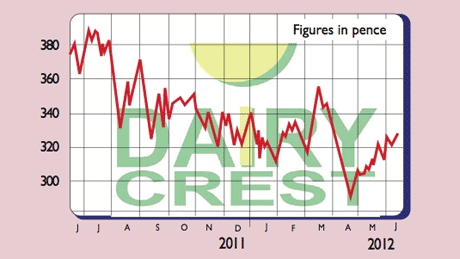
The milk business is struggling, but a big dividend makes the shares a buy, says Phil Oakley.
The business
At more than two billion litres a year, Dairy Crest is one of the biggest users of milk in Britain. The company’s main business is in processing and delivering milk to supermarkets, smaller shops and a million households. It has four milk-packing dairies in England and buys milk from 1,300 dairy farmers.
However, most of Dairy Crest’s profits come from its cheese and spreads unit, where it owns several well-known brands, including Country Life, Clover, and Utterly Butterly. It also owns St Hubert, the biggest spreads business in France.
On top of that, Dairy Crest has a food wholesaling and ingredients business selling to outlets such as hotels, restaurants and cafes. It has recently bought MH Foods, the owner of the FryLight one-calorie cooking oil brand. Dairy Crest had sales of £1.6bn for the year to March 2012.
The history
Dairy Crest’s roots go back to the Milk Marketing Board (MMB) that was set up by the government in 1933 to help buy and sell milk from struggling dairy farmers. During the 1960s the MMB started to use its surplus milk to make butter and cheese and branded the products ‘Dairy Crest’.
Country Life butter was launched in 1970 and became a prominent British brand in the 1980s due to its popular advertisements. In 1979, MMB expanded its cheese-making business by buying the Davidstow and Chard creameries from Unigate. By the late 1980s, Dairy Crest had become a separate firm in its own right. The 1990s saw the launch of the Frijj flavoured milk brand and the purchase of Cathedral City cheese. In 1996, it floated in London.
During the early 2000s, Dairy Crest went on an acquisition spree, buying Unigate Dairies, St Ivel spreads and Express Dairies. In 2007, it bought St Hubert spreads business in France and Italy, but has so far failed to build a significant business on the continent.
In recent years the milk business has struggled, squeezed by higher milk, fuel and plastics costs, while its large supermarket customers have pushed down selling prices. However, the cheese and spreads business has done well.
The chief executive
Mark Allen, former head of dairy operations, has been CEO since 2007. He’s been at the firm since 1991 and was credited with developing its cheese business and the Cathedral City brand. His basic salary is £517,000.
Should you buy the shares?
Dairy Crest is working hard to make reasonable profits from its dairy business, but it’s a tough job. Milk is essentially a commoditised business dominated by supermarket own-label brands. Dairy Crest has little, if any, pricing power with these customers. It is cutting costs and reducing the number of dairies in order to put the business on a sounder footing.
The outlook is more promising in its cheese and spreads business. Cathedral City cheddar continues to grow strongly with Dairy Crest upping production to meet higher demand. Clover and St Hubert spreads are also doing well, while sales of Frijj flavoured milk remain the one bright spot in a difficult milk market.
After failing to build a big European business, it looks as if Dairy Crest might sell its very profitable St Hubert spreads unit. This should fetch a good price and could wipe out most, if not all, of Dairy Crest’s debt. Alternatively, any proceeds could be used to buy other successful dairy brands, such as Premier Foods’ Ambrosia or Yeo Valley’s yoghurt.
The key draw of the shares is the chunky dividend yield. This is covered 2.4 times by profits and looks safe, but may be reviewed after any sale of St Hubert. While debt levels are quite high they are not at dangerous levels, with interest payments covered five times by operating profits. So even though the dairy business isn’t particularly attractive, the cheese and spreads business with its valuable brands make up for it. Throw in a cheap valuation and big dividend and we rate the shares a ‘buy’.
The numbers
Stockmarket code: DCG
Share price328p
Market cap£438m
Net assets (March 2012)£274m
Net debt (March 2012): £336m
P/e (current year estimate): 6.9 times
Yield (prospective): 6.4%
What the analysts say
Buy: 8
Hold: 3
Sell: 2
Average price target: 348p
Directors’ shareholdings
M Allen: 192,505
A Murray:150,021
M Wilks: 18,500